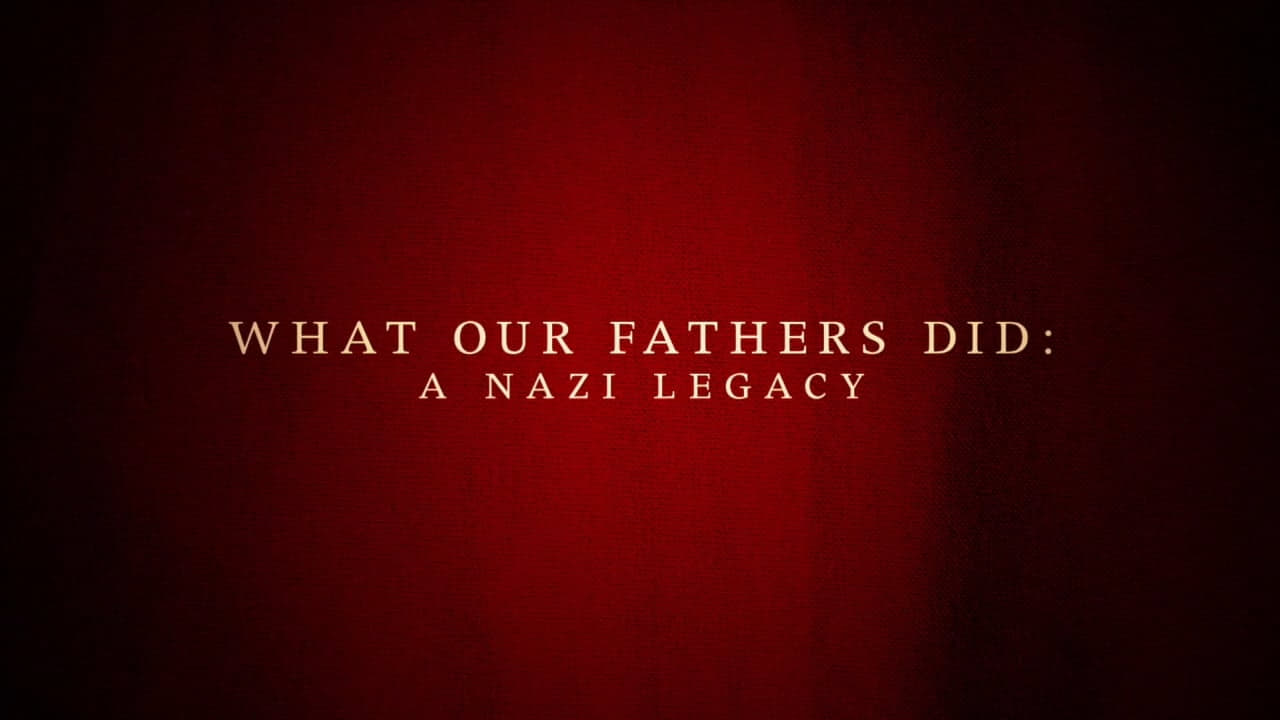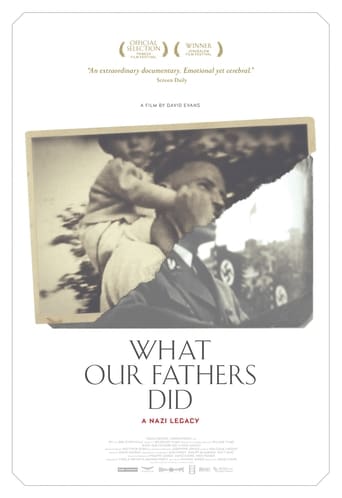

While a few reviews across the internet have said this is not a good documentary because of the bullying of the one elderly man, I beg to differ. This documentary is about showing how two elderly men who had fathers in power that were nazis. One elderly man is fine accepting that his father was horrible. The other elderly man refuses to accept his father was horrible. Its meant to show us how strong people can be about their views on both sides, especially when confronted with the truth. The one man that that kept defending his father is the one some people support because, as the man says, his father did not kill anyone. He did not fire a gun. He did not do anything. He was simply the "ruler" and had to follow orders or else he would be killed. If anything this man tells us his father tried to help the Jews. Despite having no evidence of that really. Even when shown documents that his father gave orders and paid the people under him to kill jews, he still denied that his father was to blame. And in reality that is not how things work. If I hire someome to kill someone else, I may not do the killing. But I am responsible since I hired someone to kill someone else. The elderly man doesn't realize the point the other elderly man (and the third man) was trying to make was that his father would have been a truly good man if he refused the orders and let himself be killed. But because he didn't want to die, he instead did what he was told and thus passed on the orders too. Which made him part of the killing of the Jews. A TINY part of you can almost understand why he defends his father. Its his father, despite not knowing him really as a child, you don't want to live in shame of knowing your father was bad. However, most of you realizes its just how things are. You have to accept your father did what he did. You as his child do not have to live with that guilt because you were a child at the time. Your father my have been a horrible person, but you are your own person and have your own legacy.Which is why the other elderly man was someone I agreed with on everything. He didn't have any pride in being his fathers son. He didn't make excuses for his father. He accepted his father was a bad man, a nazi. And while the documentary doesn't really end on any sort of resolution, it does however leave you thinking about how people think in these situations. And it also makes you realize just how much nazism is still out there today. You see a event going on at which the elderly man (in denial) seems to almost enjoy where people are dressed up in nazi gear. Even with kids with shaved heads are at it. It is scary to think these sort of people still exist and are teaching their kids such things. You almost feel as if the eldery man is not really in denial, buy maybe a nazi sympathizer. Which he could very well be.
... View MoreThis documentary follows two different men who were sons of prominent figures during WW2. The person who does the interviews had several relatives who died in the war. This leads to an obvious bias on the part of the interviewer, but nonetheless it manages to reveal a sense of complication - both mental and emotional - created by such extreme events of the past. If your mind and heart are open, you will get much more out of this documentary.Some people say this has a political message / bias to it. But to me, the fact that real people were asked to encounter questions the enormity of which the world has never seen, and hopefully will never see again, negates any sense of intentionality of a "take away" message. In the end, it's left up to the viewer to decide - and that may be the most difficult part, realizing that a "decision" in terms of right and wrong are not always as clear as they seem. Not when it's personal. Not when it's your own father who was involved in such atrocities as this.
... View MoreSands seems hell-bent on destroying Horst. Sands obviously is on a mission to bring the guy down. I find it very ironic that Sands uses bullying tactics that the Nazi's used to push Horst into saying things or admitting things that he simply doesn't believe! Nik Frank is almost pathetic as Sand's lacky running around denouncing his father at every opportunity. There were many people involved in the running of the system then and I sympathize with Horst when he is trying to say that things were more complex than we can understand being removed by so many years. Everything is rarely as black and white as some people would like to believe. I was left with a very unsettling feeling after it was over. I don't like all the assumptions that are made and I especially don't like that Nik Frank says the day of his father's execution is a happy day for him. Regardless of what his father was accused of I find that very disturbing. Having said all that the film still gives insight into a very important period of history and some unique perspectives that are important to understanding the time period.
... View MoreMY NAZI LEGACY (using the UK television release title) is a straightforward documentary in which human rights lawyer Philippe Sands confronts two elderly Germans (Niklas Frank and Horst von Wachter) with evidence of their fathers' involvement in the "Final Solution" during the Second World War. Together they travel to the city of Lviv, now in Poland, where thousands of Jews were sent to their deaths, and Sands interviews the two men as to what their feelings are about their fathers' behavior.Frank is, to coin a phrase, brutally frank, about his father, a high-ranking officer in the Nazi hierarchy who willfully believed in the justice of the "Final Solution." One sequence taking place in an historic city building, which once served as the Nazi meeting- place, is especially gruesome, as Sands reads out the transcript of a speech given by Frank's father where he made a macabre joke about the number of people being sent to their deaths.Von Wachter's reaction to his father's role in the war is a lot more complex. While acknowledging the Nazi Party's cruelty (which encourages him during his life to collaborate in any way he can with Jewish people), he does not believe for one moment that his father was culpable; rather he was a fundamentally good man forced to carry out his duties within a sadistic organization on pain of death. Despite all the evidence presented in front of him, Von Wachter remains resolute - so much so that the long-standing friendship between himself and Frank is put in grave danger.Our reaction to this documentary is a complex one: while we understand and empathize with Sands's determination to make Von Wachter acknowledge his father's complicity (most of Sands's family had been wiped out as a result of the killings), we do get the feeling that he is putting undue pressure on an elderly man without acknowledging the complexity of Von Wachter's feelings. Having spent seven decades harboring a particular image of his father, it is obviously difficult for him to change it.In the end we wonder what the purpose of the documentary actually is: were the filmmakers hoping for a Hollywood-style happy ending in which Von Wachter would break down and undergo a change of heart, thereby proving the justness of Sands's cause? Or did they deliberately manipulate the emotions of an old man so as to emphasize the fact that there were still neo-Nazis around, seven decades after the Second World War had ended? I am not condoning Von Wachter's responses in any way; but I do believe that the more pressure Sands put on him to change them, the less he was willing to do so.MY NAZI LEGACY is a harrowing piece, but perhaps a little manipulative in its structure.
... View More